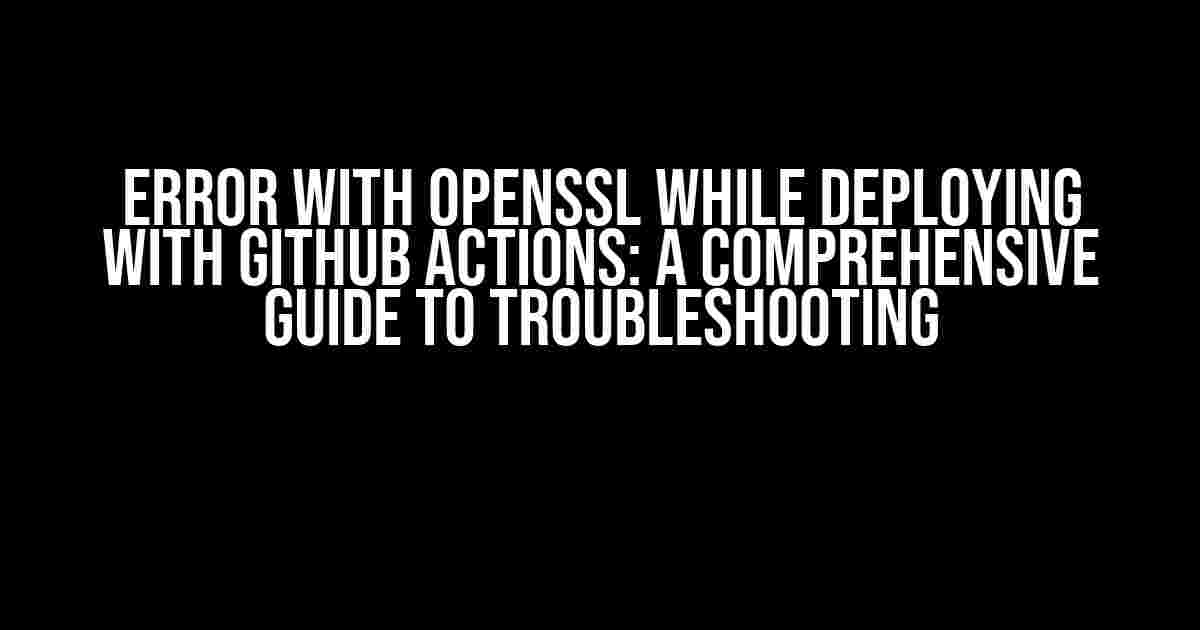Are you tired of encountering errors with OpenSSL while deploying your application with GitHub Actions? You’re not alone. In this article, we’ll delve into the common issues that arise when using OpenSSL with GitHub Actions and provide you with clear, step-by-step instructions to troubleshoot and resolve them.
What is OpenSSL and why do I need it?
OpenSSL is a cryptographic library that provides a secure way to transfer data over the internet. It’s widely used in web development to enable HTTPS connections, which is essential for securing online transactions and protecting sensitive information. GitHub Actions, a continuous integration and continuous deployment (CI/CD) platform, relies on OpenSSL to secure the connection between your repository and the deployment environment.
Common Errors with OpenSSL and GitHub Actions
Here are some common error messages you may encounter when using OpenSSL with GitHub Actions:
Error: OpenSSL SSL_write: syscall failure: Software caused connection abortError: OpenSSL SSL_read: syscall failure: Connection reset by peerError: unable to get local issuer certificateError: certificate verify failed
Troubleshooting Steps
Before we dive into the solutions, let’s go through some preliminary checks to ensure your OpenSSL installation is correct:
-
Verify that OpenSSL is installed on your system by running the command
openssl versionin your terminal. -
Check that your OpenSSL version is up-to-date by running
openssl update.
Solution 1: Certificate Issues
If you’re encountering certificate-related errors, follow these steps:
-
Check the certificate chain: Use the command
openssl s_client -connectto verify the certificate chain. Replace:443 with your domain name. -
Verify the certificate authority (CA) bundle: Ensure that the CA bundle is up-to-date and correctly configured. You can use the command
openssl verify -CAfileto verify the certificate. -
Check for certificate expiration: Verify that your certificate is not expired by running
openssl x509 -in.-noout -dates
Solution 2: Connection Issues
If you’re experiencing connection-related errors, try the following:
-
Check the OpenSSL configuration: Ensure that the OpenSSL configuration file (usually located at
/etc/ssl/openssl.cnf) is correctly configured. You can use the commandopenssl config -listto verify the configuration. -
Verify the TLS version: Check that the TLS version is correctly configured. You can use the command
openssl s_client -connectto test the connection.:443 -tls1_2 -
Check the firewall and network configuration: Ensure that the firewall and network configuration allow the connection to the deployment environment.
Solution 3: GitHub Actions Configuration
If you’ve checked the OpenSSL installation and configuration, but still encountering errors, it’s time to review your GitHub Actions configuration:
-
Verify the workflow file: Check the workflow file for any syntax errors or misconfigurations. You can use the GitHub Actions validator to verify the file.
-
Check the environment variables: Ensure that the environment variables are correctly set in your workflow file. You can use the command
echo $ENV_VARto verify the variable values. -
Verify the deployment script: Check the deployment script for any errors or misconfigurations. You can use a tool like
debuggerto step through the script.
Advanced Troubleshooting
If you’ve tried the above solutions and still encountering errors, it’s time to dig deeper:
SSL/TLS Debugging
Use the OpenSSL command-line tool to debug SSL/TLS connections:
openssl s_client -connect:443 -servername -showcerts -debug
This command will provide detailed information about the SSL/TLS connection, including the certificate chain, TLS version, and encryption details.
Network Debugging
Use tools like tcpdump or wireshark to capture and analyze network traffic:
tcpdump -i any -n -vv -s 0 -c 100 -W 100 port 443
This command will capture 100 packets of network traffic on port 443, providing detailed information about the connection attempts.
Conclusion
Error with OpenSSL while deploying with GitHub Actions can be frustrating, but by following the troubleshooting steps outlined in this article, you should be able to identify and resolve the issue. Remember to:
- Verify the OpenSSL installation and configuration
- Check for certificate issues and connection problems
- Review the GitHub Actions configuration and deployment script
- Use advanced debugging tools to troubleshoot SSL/TLS and network issues
By following these steps, you’ll be well on your way to resolving the error and successfully deploying your application with GitHub Actions.
| Action | Command |
|---|---|
| Verify OpenSSL version | openssl version |
| Update OpenSSL | openssl update |
| Verify certificate chain | openssl s_client -connect |
| Verify CA bundle | openssl verify -CAfile |
| Check certificate expiration | openssl x509 -in |
| Debug SSL/TLS connection | openssl s_client -connect |
| Capture network traffic | tcpdump -i any -n -vv -s 0 -c 100 -W 100 port 443 |
Remember to replace the placeholders (
Additional Resources
If you need further assistance or want to learn more about OpenSSL and GitHub Actions, check out these resources:
By following this comprehensive guide, you should be able to troubleshoot and resolve errors with OpenSSL while deploying with GitHub Actions. Happy coding!
Frequently Asked Question
Stuck with openssl errors while deploying with GitHub Actions? Don’t worry, we’ve got you covered! Here are some frequently asked questions to help you resolve the issue:
What causes the openssl error while deploying with GitHub Actions?
The openssl error is often caused by a mismatch between the OpenSSL version used by GitHub Actions and the version required by your project. This mismatch can occur when your project requires a specific version of OpenSSL, but GitHub Actions uses a different version.
How do I specify the OpenSSL version in my GitHub Actions workflow?
You can specify the OpenSSL version by adding a step in your GitHub Actions workflow file (.yml) to install the required version of OpenSSL. For example, you can add a step like this: `run: sudo apt-get install libssl1.1` to install OpenSSL 1.1.
What if I’m using a Docker image in my GitHub Actions workflow?
If you’re using a Docker image in your GitHub Actions workflow, you can specify the OpenSSL version by adding a `RUN` command to your Dockerfile to install the required version of OpenSSL. For example, you can add a command like this: `RUN apt-get update && apt-get install -y libssl1.1` to install OpenSSL 1.1.
Can I use a GitHub Actions environment variable to specify the OpenSSL version?
Yes, you can use a GitHub Actions environment variable to specify the OpenSSL version. You can set an environment variable like this: `OPENSSL_VERSION: 1.1` and then use it in your workflow file to install the required version of OpenSSL.
What if I’m still getting the openssl error after trying the above solutions?
If you’re still getting the openssl error, try checking your project’s dependencies and ensure that they are compatible with the OpenSSL version used by GitHub Actions. You can also try debugging your workflow by adding more logging statements to identify the exact cause of the error.


